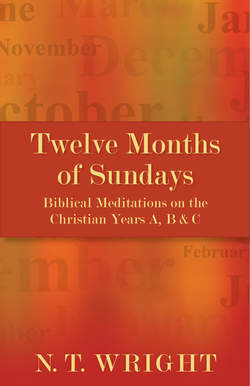Читать книгу Twelve Months of Sundays - N.T. Wright - Страница 45
На сайте Литреса книга снята с продажи.
ОглавлениеProper 4
Genesis 6.9–22; 7.24; 8.14–19
Romans 1.16–17; 3.22b–28 [29–31]
Matthew 7.21–29
‘These words of mine.’ No wonder they thought Jesus was claiming an authority of his own, superior to that of the scribes. They would never have claimed anything for their own words, merely for those of the text they were expounding.
The house on the rock, arguably, is another picture of the Temple – which Herod Antipas was still building, and against which Jesus addressed some of his sternest words. The whole Sermon has constituted a claim that the way things are going in Israel is a mistake, a disobedience, and that this is the last chance to get back on track, to be the light of the world. Failure now will mean the destruction of the Temple and all that it stood for. The Sermon on the Mount balances Matthew’s final discourse (chs 23—25), where these warnings reach their height.
Jesus, meanwhile, is warning sternly against an easygoing discipleship which, while keeping companionship with him, fails to take seriously the challenge of the gospel, the absolute demands for God-centred holiness and renewed integrity. How easy, then and now, to be around Jesus, to enjoy something of his influence, but to keep options open when it comes to actual choices about behaviour and life direction. Easy, maybe, but about as useless as trying to learn to swim while keeping one foot on the bottom for safety. That won’t do you any good when the floods come.
As come they will. Jesus’ warnings of judgement call up the image of Noah and his ark. Among the many lessons of that wonderful story is God’s promise never again to destroy the earth in such a fashion; but, as Jesus makes clear, this doesn’t mean that God is now taking a more easygoing attitude as far as wickedness is concerned. It still defaces his good creation, and he still hates it as much as ever. We may want to be generous in speaking of judgement in relation to others, but for ourselves we do well to be sober and sanguine. There is such a thing as being close to Jesus but never truly knowing him, and a more terrible discovery it is hard to imagine.
The lectionary makes a Nijinsky-like leap from part of the introduction to Romans into part of its second main section. The result is like a doctor giving a prescription without anyone knowing what the disease is. Only when we have fully appreciated the scale of human wickedness, infecting God’s people as much as everyone else, can we understand just how breathtaking it is to be told that because of Jesus’ sacrificial death God now justifies, freely, by grace alone, all who believe the gospel. Only those who appreciate that the flood – both Noah’s, and that about which Jesus is warning – is God’s sober and proper reaction to human rebellion, neither capricious nor malevolent, can appreciate what it means for God’s saving, world-healing righteousness to be unveiled in the message of Jesus Christ.
